Russia’s Vision for a New World Order: Key Takeaways from Putin’s 2024 Valdai Club Speech
In Sochi, Putin outlined his vision for a multipolar world, criticizing Western hegemony and advocating for global cooperation based on respect for cultural identities and sovereignty.
During the 21st annual meeting of the Valdai Discussion Club in Sochi on November 7, 2024, Russian President Vladimir Putin delivered a thought-provoking speech, covering a range of issues from shifting global powers to the role of cultural sovereignty. His address offered a sweeping narrative on the world’s evolving order, as he sees it, and outlined Russia’s perspective on global cooperation, security, and respect for cultural identities. By reflecting on history and the unique challenges of our time, Putin’s speech framed Russia as a voice for a multipolar world—one where nations operate as equals, unbound by unilateral influence. Here are the central themes and messages that emerged.
A World in Profound Transition
Opening his address, Putin drew a historical parallel to the Russian Revolution of 1917, reminding the audience how past revolutions reshaped societal and political frameworks worldwide. Today, he argued, we are witnessing a similar seismic shift—one that is reshaping global alliances, values, and societal priorities. The current era, as he sees it, is one of “revolutionary change,” demanding that societies not only adapt but reevaluate their core principles in light of emerging challenges.
As societies grapple with issues from technological upheavals to environmental crises, the traditional frameworks for international order, established after WWII, are steadily eroding. Putin emphasized that new alliances are taking shape, ones driven not by dominance but by mutual interest. He painted a picture of the world in flux, challenging old norms and navigating complexities with no precedent, where powerful nations and societies alike must adapt or risk destabilization.
Challenging the Notion of Hegemony
At the heart of the speech was a critique of Western dominance, particularly that of the United States, in world affairs. The president asserted that the Western model of imposing governance and democratic values on other nations disregards unique cultural and historical contexts. This approach, he argued, leads to destabilization, as seen in regions like the Middle East. According to him, the Western strategy of advancing democracy through intervention has largely been a failure, creating unrest instead of fostering peace.
From the Russian perspective, a shift is needed: a world order rooted in respect for each nation’s sovereignty and cultural differences, where no country assumes the right to impose its will. In his view, the idea of unipolar dominance has proven both unworkable and unsustainable in an increasingly interconnected, multipolar world.
Advocating Multilateralism and the BRICS Model
Offering an alternative to the Western-led order, the Russian leader expressed a strong endorsement of multilateral cooperation through organizations like BRICS, which brings together 23 nations now. He positioned BRICS as a model of equitable cooperation and highlighted its significance in Russia’s recent chairmanship. The BRICS framework, he suggested, exemplifies how diverse nations can work together on equal footing, respecting each other's independence and fostering real partnership.
This approach aligns with his call for a multipolar world, where power is distributed more equitably, allowing regional partnerships to emerge and replace outdated Western-dominated structures like NATO. By stressing the importance of organizations that operate outside the influence of the West, Putin illustrated his vision of a balanced global order that serves the interests of many rather than the narrow ambitions of a few.



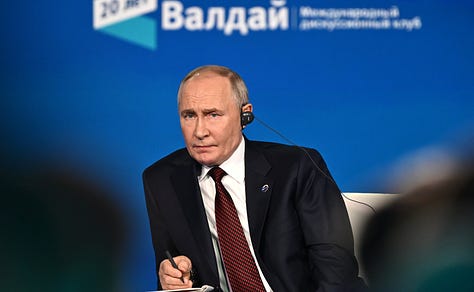
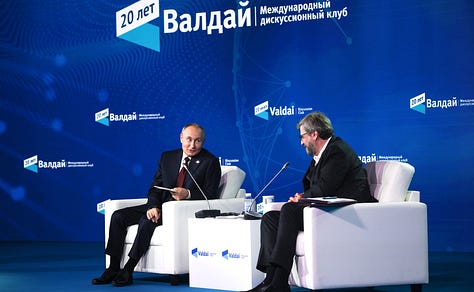


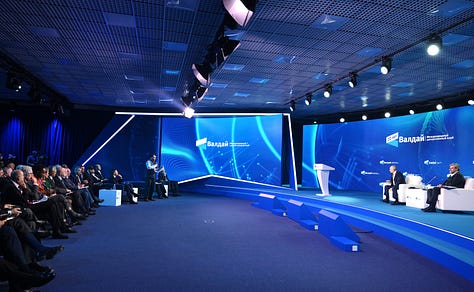
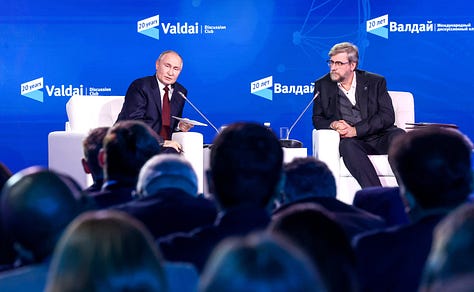
Criticism of Western Liberalism and “Intolerance”
The address included a critique of contemporary Western liberalism, which Putin characterized as increasingly intolerant of differing views. In his view, the West’s aggressive promotion of its own ideological values is pushing away nations that might otherwise seek dialogue. He argued that Western liberalism now disregards the values it once championed—democracy, free speech, and the rule of law—in pursuit of ideological conformity.
He warned that this brand of intolerance risks marginalizing alternative perspectives, creating a world order that punishes rather than respects cultural diversity. Russia, he suggested, offers a different vision of liberalism—one that allows countries the freedom to develop their governance in ways that align with their unique cultural and historical contexts, rather than conforming to an imposed ideal.
Russia’s Role as a Guardian of Sovereignty and Stability
Throughout his speech, Putin emphasized that Russia does not seek to impose its values on others, contrasting this with what he sees as the Western drive for ideological dominance. Instead, he framed Russia as a defender of sovereignty and a stabilizing force on the global stage. According to him, Russia stands ready to support other nations’ right to self-determination and national pride without interfering in their internal affairs.
One of the clearest examples of this perspective was his stance on Ukraine, where he accused the West of using Ukraine as a pawn in a geopolitical chess game aimed at undermining Russia. While acknowledging that Russia will defend its people and territory, he insisted that his country is not seeking confrontation. Rather, he argued, it is responding to Western aggression in defense of its national sovereignty and its citizens.
Warnings About the Risk of Nuclear Escalation
A somber theme running through the speech was the growing risk of nuclear conflict in an increasingly fragmented world. The Russian president cautioned Western leaders about their “reckless” rhetoric regarding inflicting a “strategic defeat” on Russia, a nuclear power. He warned that such attitudes risk a dangerous miscalculation, with potentially catastrophic consequences for global security.
This warning underscored Russia’s longstanding nuclear doctrine: nuclear weapons serve as a deterrent, but Moscow stands ready to use them defensively if faced with an existential threat. By reiterating this position, he aimed to remind the international community of the grave risks inherent in escalating tensions with a nuclear-armed nation.
Critique of NATO and Military Alliances
Putin expressed strong opposition to NATO’s expansion and other Western military alliances, which he views as relics of a bygone era that do more to divide than unify. He particularly criticized NATO’s continued eastward expansion, which he argued only serves to stoke tensions and undermine European stability. According to his view, NATO’s actions are a throwback to Cold War policies, perpetuating division rather than fostering cooperation and understanding.
In his vision, the West should work towards greater cooperation, acknowledging Russia’s security concerns instead of perpetuating divisive alliances. Without this, he warned, Europe could face prolonged instability and a heightened risk of conflict.
Global Challenges Beyond Politics
Moving beyond geopolitics, the speech also touched on a range of universal challenges, including climate change, social inequality, and the ethical implications of artificial intelligence. Putin recognized the pressing nature of these issues and called for a collective, cooperative approach to address them. Rather than pouring resources into ideological battles or military pursuits, he argued, the world’s leading powers should unite to solve global problems that threaten all humanity.
In his appeal to Western nations, he urged a shift away from the pursuit of dominance and toward a focus on problems that require global collaboration—issues that transcend national borders, such as environmental conservation and technological advancement.
Cultural Respect and Mutual Understanding
A major tenet of the speech was the importance of cultural respect. Putin criticized the “colonialist mindset” of imposing Western values on other societies and highlighted the need for empathy in international relations. He proposed that a peaceful world order can only be achieved by acknowledging and respecting each nation’s unique characteristics and traditions.
He presented BRICS as an example of a platform where nations collaborate without compromising each other’s identities, and he suggested that this model, based on respect and mutual benefit, is the way forward. In this vision, international cooperation is not a tool of ideological control but a mutual understanding of cultural diversity.
Russia’s Vision for a New World Order
The Russian leader’s address at the Valdai Club was not just a critique of the West but also a vision for an alternative path forward—one that champions multipolarity, respect for sovereignty, and a genuine appreciation for cultural diversity. His remarks painted Russia as a nation determined to play a stabilizing role, balancing Western power through alliances that respect each member’s autonomy.
This speech can be seen as a manifesto for Russia’s foreign policy direction, emphasizing dialogue over dominance, cooperation over control, and cultural respect over ideological imposition. In a world where ideological divides are becoming more pronounced, his message is clear: Russia envisions a future where no nation can claim superiority, and where peace and security are achieved through balanced partnerships rather than unilateral dominance.


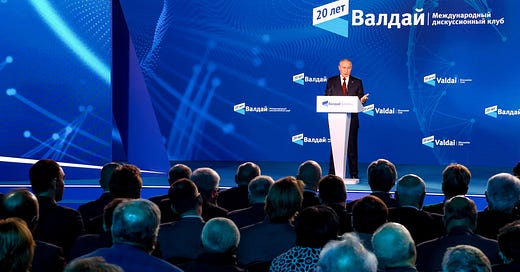



Such a pragmatic approach by Russia. May The West wake up and realize that we are not the top dogs anymore; and even better would be to realize our culture is not superior to others. All cultures and religions have their pros and cons — respecting each other’s differences is the path forward for humanity. Far too much arrogance in The West still so I suspect The West needs to get humbled before a change of course occurs — I pray that I am wrong on this.
Thank you for the great analysis 🙏
Thumbs up @VladimirPutin